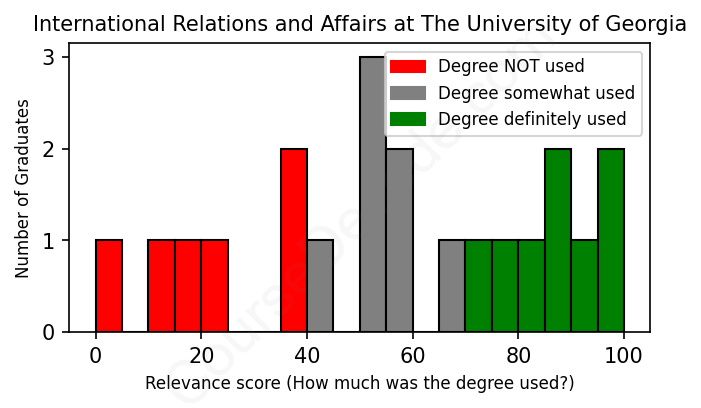
First, some facts. Of the International Relations and Affairs graduates from The University of Georgia we've analyzed , here's how many have used (or NOT used) their degree in their career:

These are estimates based on AI analysis of 21 LinkedIn profiles (see below).
The verdict? Significantly below average. Overall, with an average relevance score of 56%, International Relations and Affairs graduates from The University of Georgia have a much lower likelihood (-11%) of finding work in this field compared to the average graduate across all fields:
And for comparison, here's the chart for all profiles we've looked at across all degrees.
Also, after graduating, 66% of these graduates have pursued further education other than another Bachelor's degree (such as a Masters degree or other), compared to the average across all profiles of 35%. This suggests you may need more than just a Bachelors degree to be competitive as a International Relations and Affairs graduate.
See the details:
|
Relevance score: 4% We think this person has NOT gone into a career related to their degree. We think this person has NOT gone into a career related to their degree.
DEGREE INFOGraduated in 2013 from The University of Georgia with a Bachelor of Arts - BA in International Relations and Affairs. Also pursued further education since (see below). JOB HISTORY SINCE GRADUATIONSales Associate Orangetheory Fitness May 2016 - Aug 2017 Personal Trainer  9Round Fitness Oct 2017 - Apr 2018 Clubhouse Manager  KW PROPERTY MANAGEMENT AND CONSULTING Jul 2019 - Mar 2020 Real Estate Agent  Keller Williams Preferred Properties Aug 2021 - Present Human Resources Assistant  AvantGarde, LLC Feb 2023 - Present FURTHER DEGREES DONE SINCE GRADUATINGMaster of Public Administration - MPAGrand Canyon University 2016 - 2018 ABOUTNo information provided. |
The top 10 most common jobs done by the graduates we've analyzed (ranked most common to least) are:
When looking at jobs held by graduates with a degree in International Relations and Affairs from the University of Georgia, it’s evident that many of them have chosen paths that don’t directly align with the core focus of their studies. A significant number have ventured into roles like administrative assistants, property management, and various legal assistant positions, which primarily emphasize administrative or legal frameworks rather than the global political dynamics, diplomacy, or conflict resolution that are central to International Relations. While some roles, like those in legal support, tangentially relate to international law or human rights, many fall short of utilizing the core skills and knowledge from their degree on a daily basis.
That said, there are definitely standout positions that tie back to their education effectively. Careers in organizations like the Human Rights Campaign, World Vision, and various roles in governmental and non-profit sectors highlight the relevance of their background in International Relations. Jobs focused on community organizing, humanitarian efforts, and international trade show a clear connection to their studies, helping address global issues and societal impacts. Overall, while a number of graduates are engaged in jobs that don’t fully capitalize on their degree, there are certainly significant roles that demonstrate the applicability of their education in themes of advocacy, policy analysis, and international collaboration.
Here is a visual representation of the most common words in job titles for International Relations and Affairs graduates (this is across all International Relations and Affairs graduates we've analyzed, not just those who went to The University of Georgia):

When looking at the career trajectories of graduates from the University of Georgia with a degree in International Relations and Affairs, there seems to be a pretty mixed bag. Initially, many graduates take on roles that may not directly align with their major, such as administrative positions, community organizing, or even jobs in the service sector. It’s common for first jobs after graduation to be more about gaining experience and building skills than landing a dream job straight away. For instance, some have started in positions like receptionist or program coordinator, which may not scream "international relations," but they often lead to more relevant opportunities down the line.
Five to ten years out, however, many graduates start to find their footing in careers that are much more related to their field of study. We see a trend towards roles in law, humanitarian work, and even government positions, which is great because it suggests that they’re leveraging their education and experiences into fulfilling careers. Positions like attorney, project manager in humanitarian affairs, or staff roles within organizations like the Human Rights Campaign indicate a strong alignment with the values and skills taught in International Relations programs. That said, there are still quite a few folks who end up in fields that may not relate directly to international affairs, like HR or retail management, which shows the diverse paths one could take. Overall, it seems like while the early career stages may have some unrelated detours, there’s a significant shift towards more relevant and impactful roles a few years down the line!
Getting a Bachelor’s degree in International Relations and Affairs can be a bit of a mixed bag in terms of difficulty, and it really depends on your interests and strengths. At The University of Georgia, like many places, you’ll dive into complex topics like global politics, economics, and cultural studies, which can be challenging if you’re not super into those subjects. On the flip side, if you enjoy debate, writing, and understanding how the world works, you might find it engaging rather than grueling. Overall, it’s definitely not the easiest degree out there, but it’s also not the hardest—it really just comes down to how passionate you are about the topics!
Most commonly, in the LinkedIn profiles we've looked at, it takes people 4 years to finish a Bachelor degree in International Relations and Affairs.
Looking at the career paths of these International Relations and Affairs graduates from The University of Georgia, it seems like they’ve had a pretty mixed bag in terms of earnings. Some, like the attorneys and those working with high-profile organizations like NASA, are likely pulling in decent salaries, especially as they advance in their careers. On the other hand, many of them started off in lower-paid positions like interns or entry-level roles, which is pretty common in the field. Even though some have moved into more lucrative roles over time, there are others still in positions that might not be paying all that well, especially if they're working in the non-profit sector. Overall, it looks like while a few have likely landed on their feet financially, others might be still climbing the ladder to get to the bigger bucks.
Here is a visual representation of the most common words seen in the "about" section of LinkedIn profiles who have a Bachelor degree in International Relations and Affairs (this is across all International Relations and Affairs graduates we've analyzed, not just those who went to The University of Georgia). This may or may not be useful:

Here are all colleges offering a Bachelor degree in International Relations and Affairs (ordered by the average relevance score of their International Relations and Affairs graduates, best to worst) where we have analyzed at least 10 of their graduates:
| College | Score | Count |
|---|---|---|
 The George Washington University The George Washington University
|
70 | 36 |
 American University American University
|
64 | 21 |
 Boston University Boston University
|
63 | 12 |
 The University of Georgia The University of Georgia
|
56 | 21 |
 University of Southern California University of Southern California
|
56 | 13 |
 James Madison University James Madison University
|
53 | 11 |
 University of California, Davis University of California, Davis
|
50 | 11 |
 University of Colorado Boulder University of Colorado Boulder
|
49 | 16 |
 Florida International University Florida International University
|
47 | 36 |
 Florida State University Florida State University
|
45 | 29 |